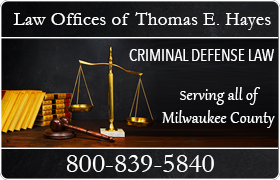 Franklin Juvenile Law Lawyers, Wisconsin
Franklin Juvenile Law Lawyers, Wisconsin
Sponsored Law Firm
-
 x
x

Click For More Info:
-
Law Offices of Thomas E. Hayes
161 W Wisconsin Ave Suite 3032 Milwaukee, WI 53203» view mapMilwaukee County Criminal Defense Over 30 Years of Experience
Clients should be comfortable with their lawyer. I am the only one who "works" my cases. My work ethic is efficient result oriented.
800-839-5840
Sponsored Lawyers
1-4 of 4 matches
Accident & Injury, Criminal, Juvenile Law, Estate Planning, Trusts
Mr. Bucher has been practicing law in Wisconsin since 1981. His area of practice includes complex litigation, criminal defense, personal injury, government law, open records/open meetings, campaign finance and election law and victim's rights. Previously he was District Attorney of Waukesha County, WI where he handled cases from police executions, murders, sex assault, robbery, narcotics, corruption, traffic, DWI, open records/meetings, elections and numerous other areas. In the Spring of 2023, Attorney Bucher merged his firm with Attorneys Peter Wolff and Ronald Sonderhouse, to form Bucher, Wolff & Sonderhouse, LLP.
(more)Criminal, Divorce & Family Law, Juvenile Law, DUI-DWI, Estate Planning
Attorney Peter M. Wolff is a managing partner at Bucher, Wolff & Sonderhouse, LLP that focuses on criminal defense and family law. Before Peter was a lawyer, he served as a law enforcement officer in Wisconsin for ten years. Peter earned his Juris Doctorate in 2002 from Marquette University Law School. Upon graduation, he was admitted to the Wisconsin Bar in 2003. In addition, Attorney Wolff is also admitted to practice law in the U.S. District Court Eastern District of Wisconsin and the U.S. Court of Appeals 7th Circuit. To schedule a free consultation with Attorney Wolff, visit his website, or call 262-232-6699.
(more)



 Thomas Hayes Milwaukee, WI
Thomas Hayes Milwaukee, WI Contact UsRequest Consultation Now
Contact UsRequest Consultation Now Law OfficeLaw Offices of Thomas E. Hayes
Law OfficeLaw Offices of Thomas E. Hayes


